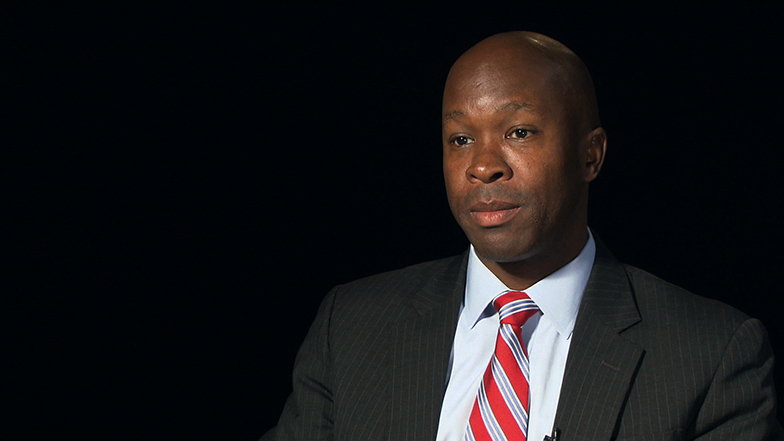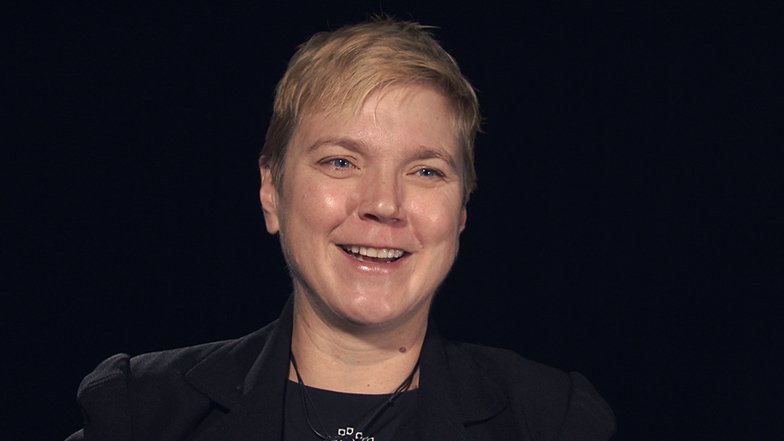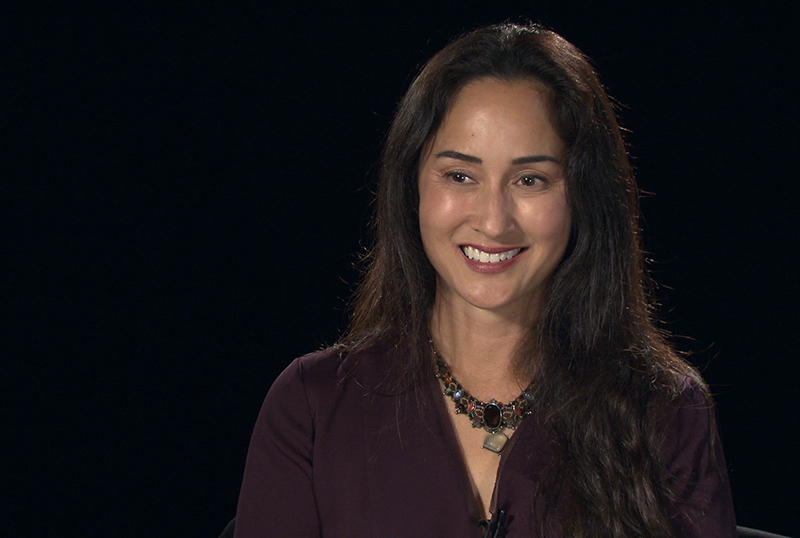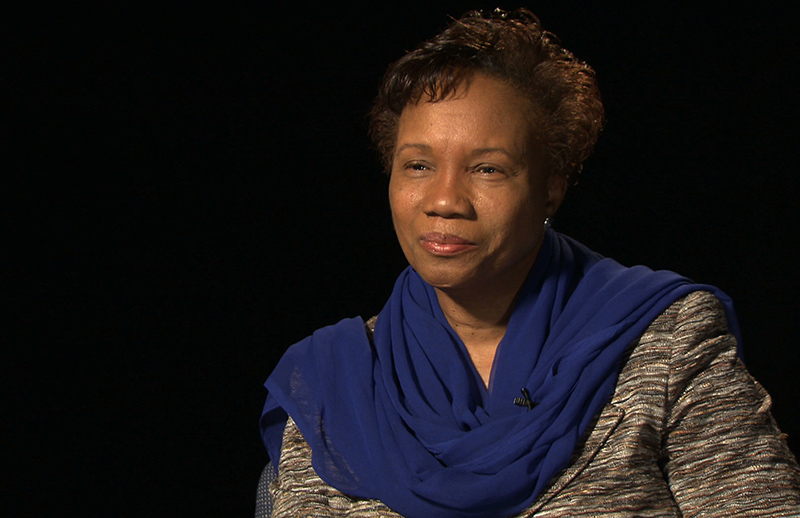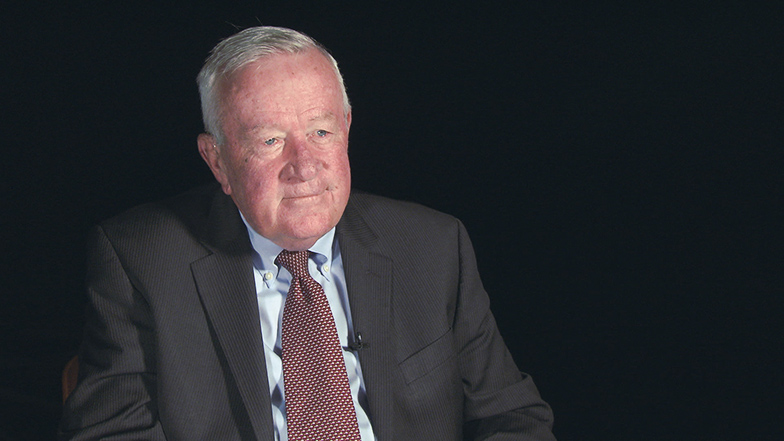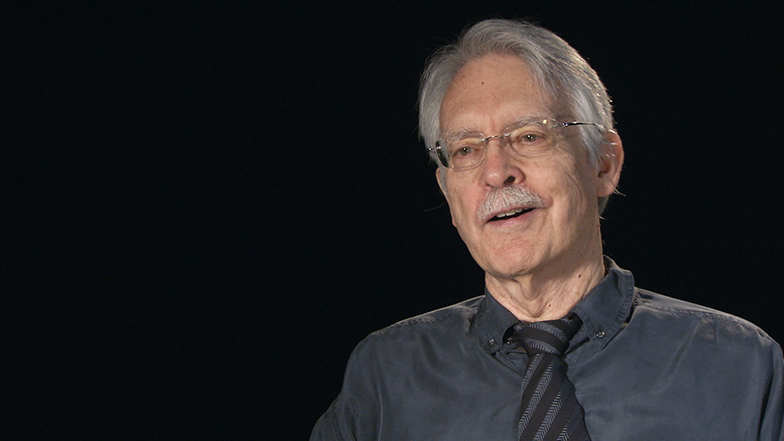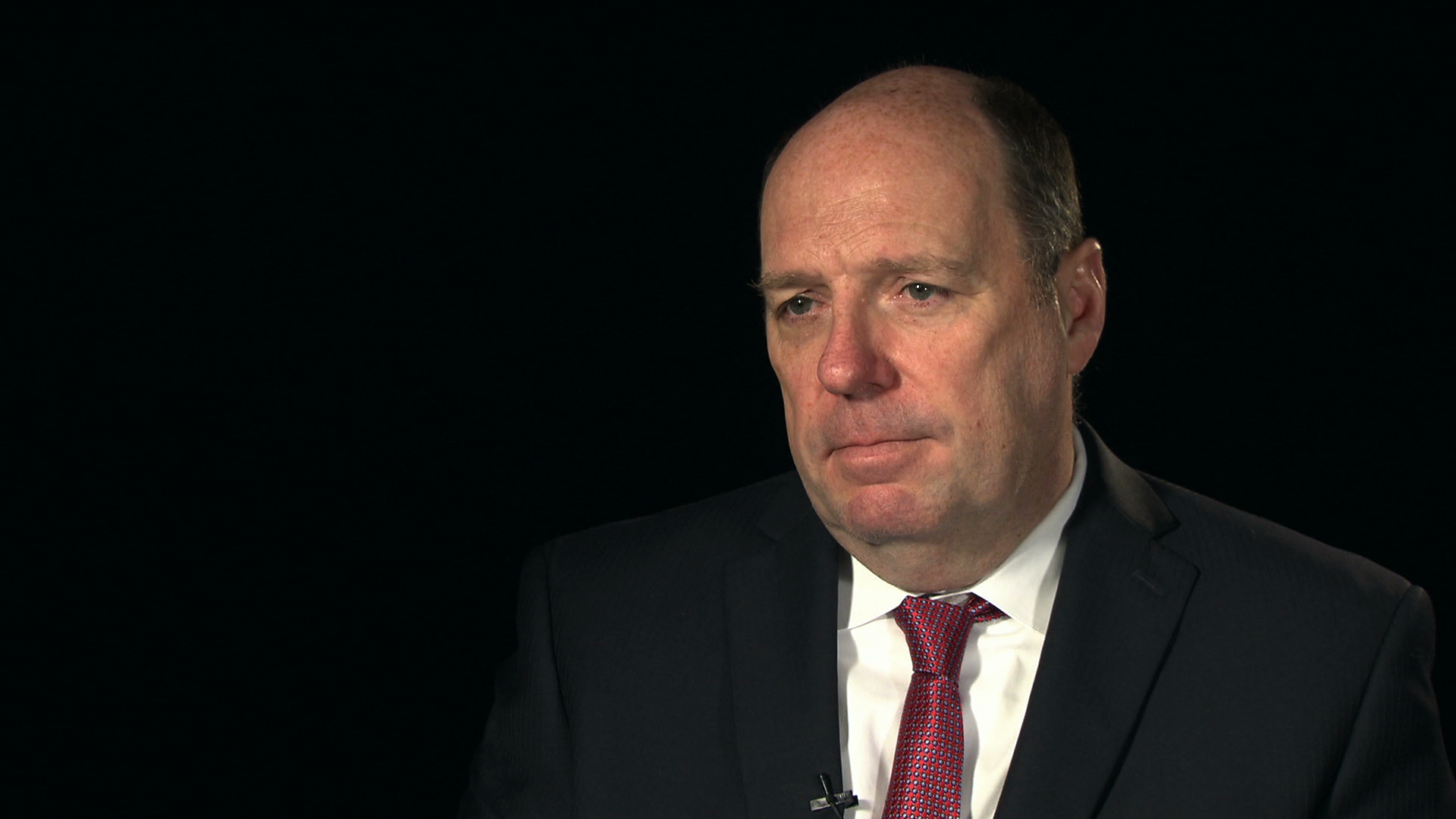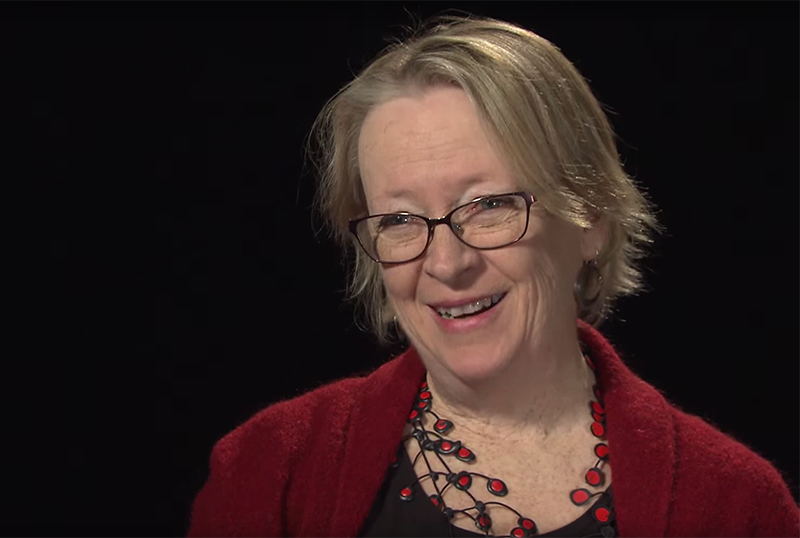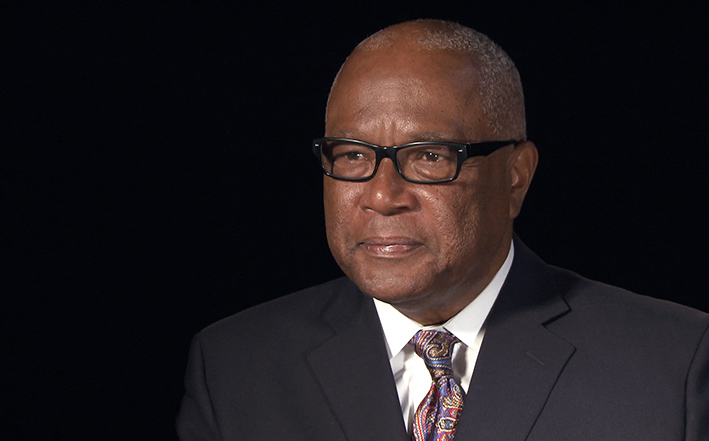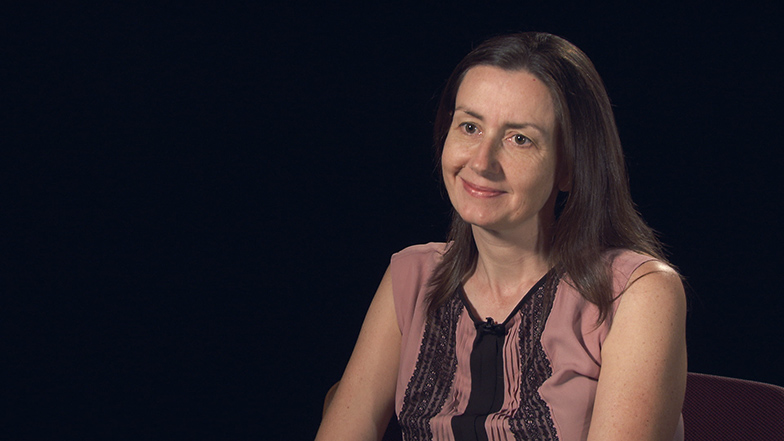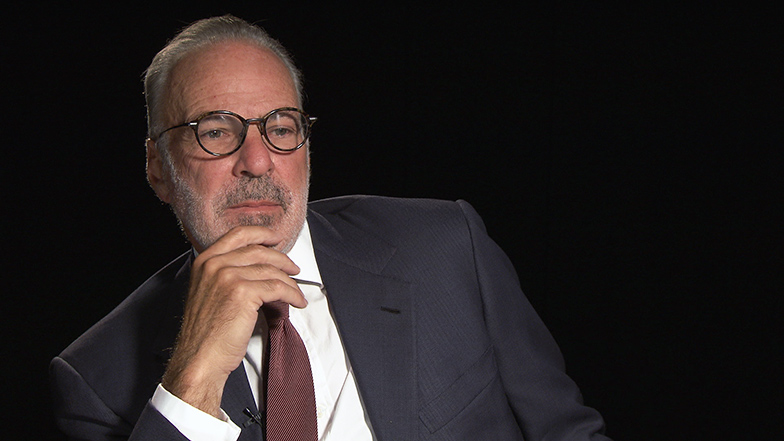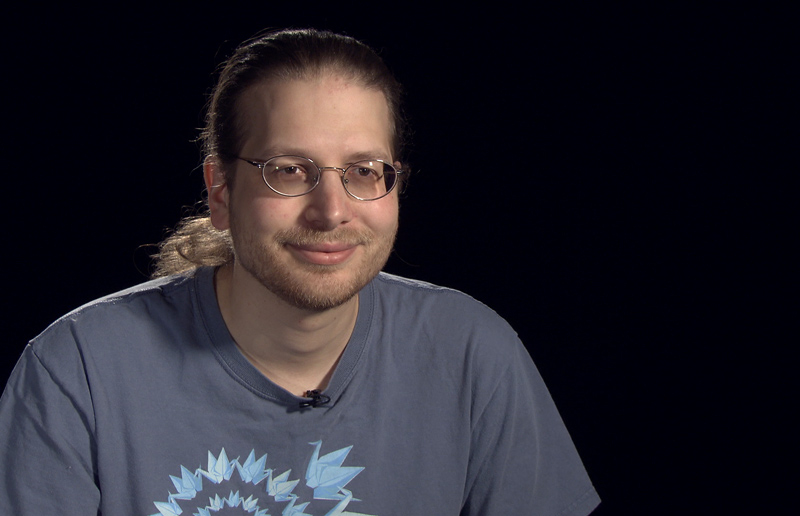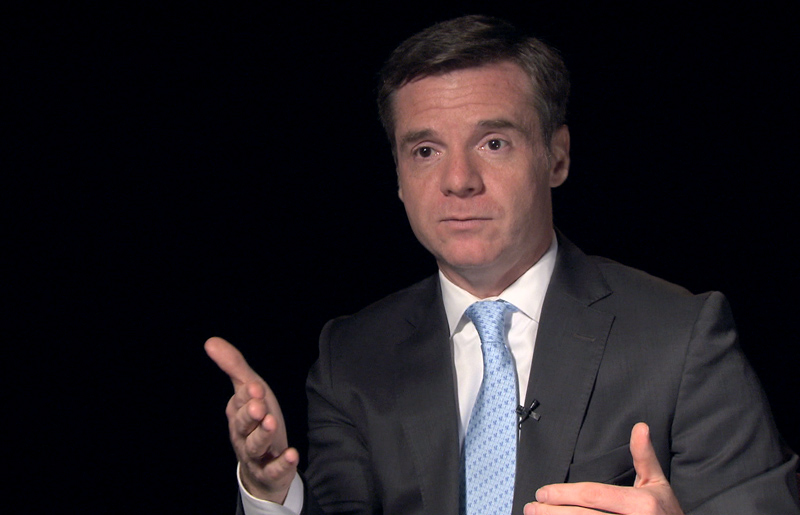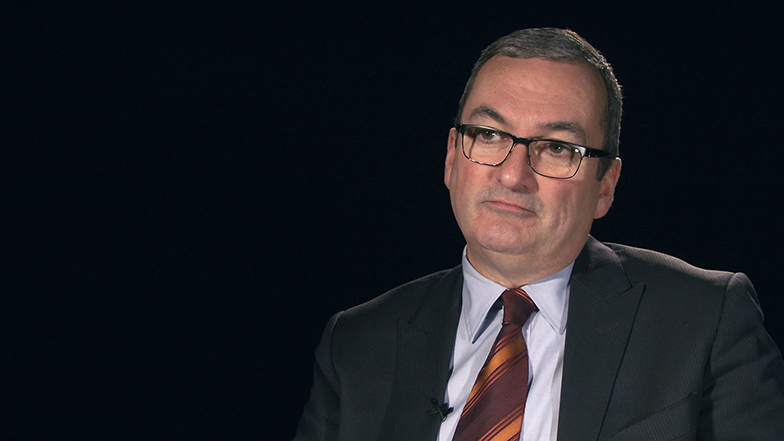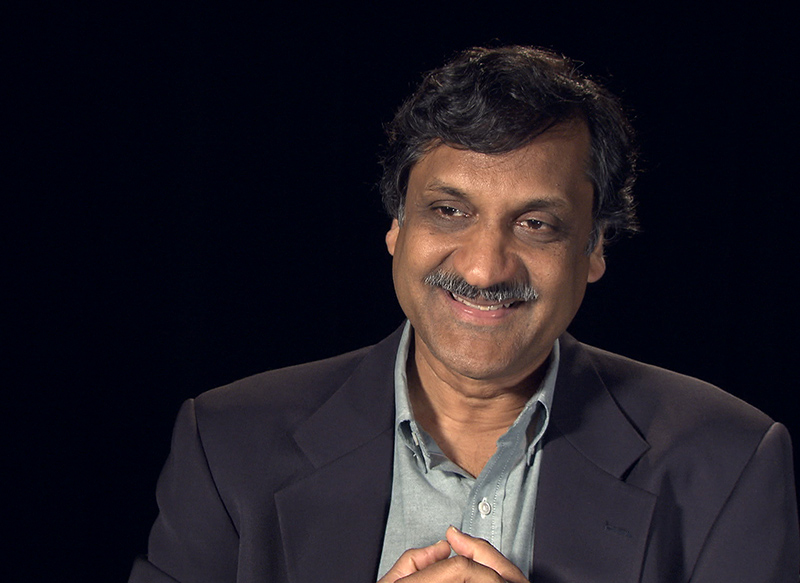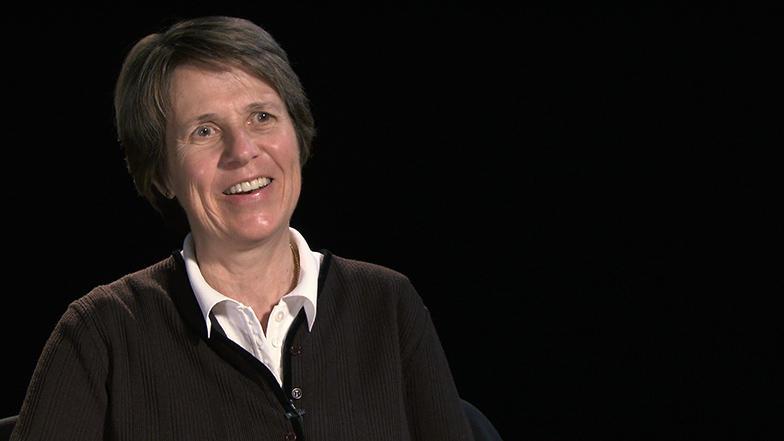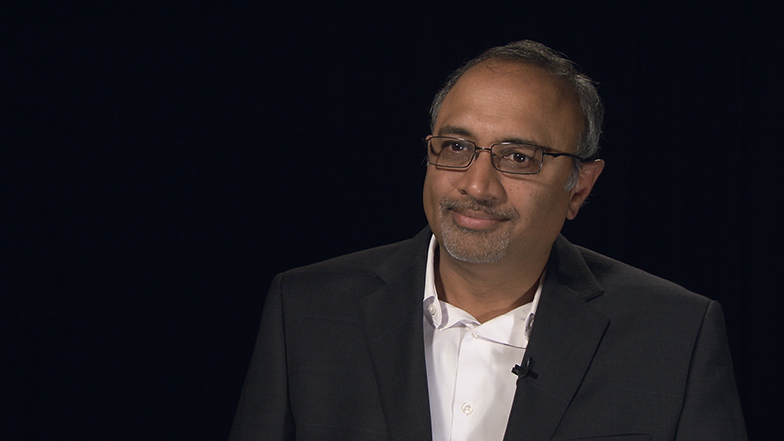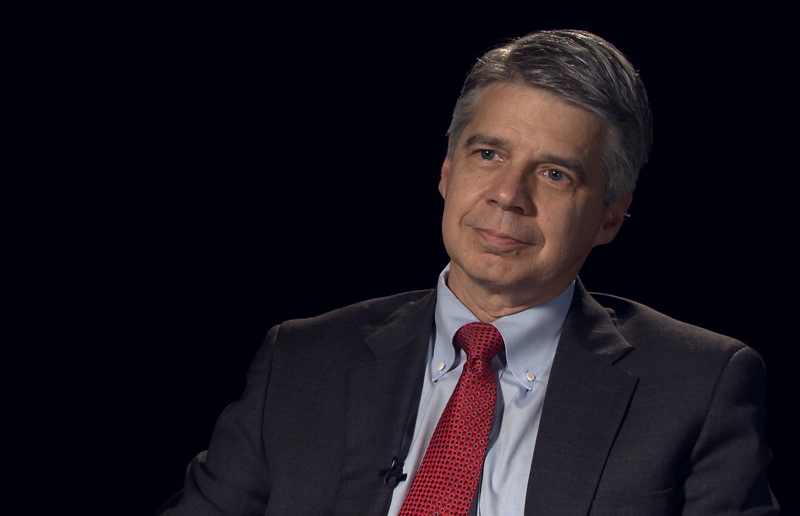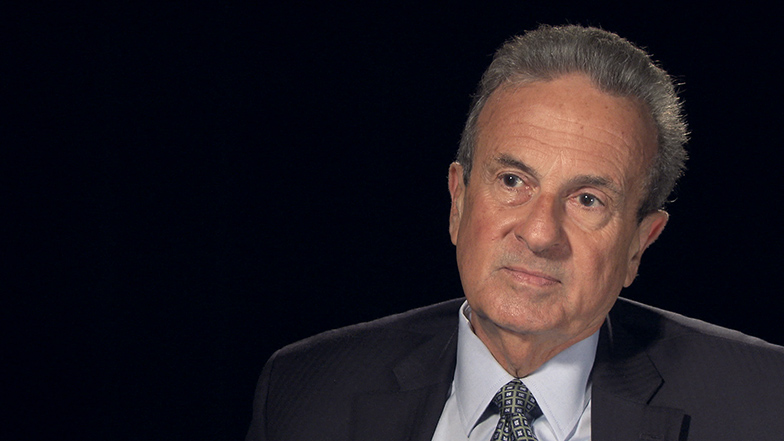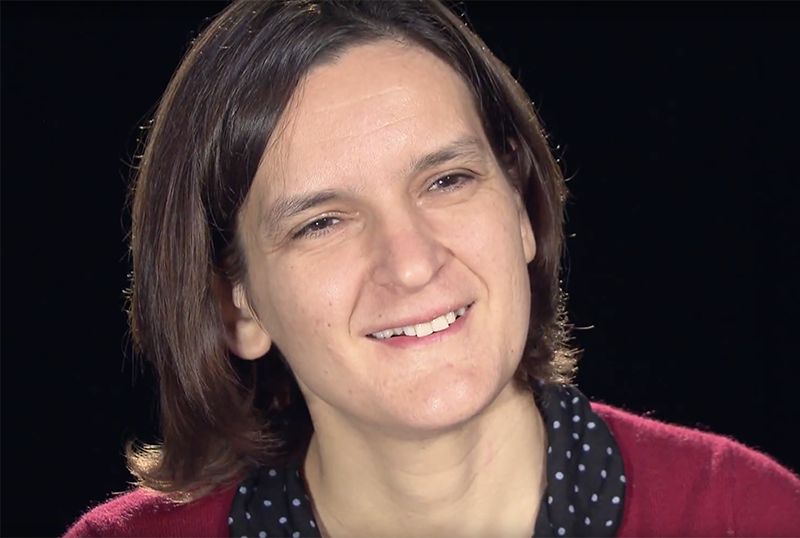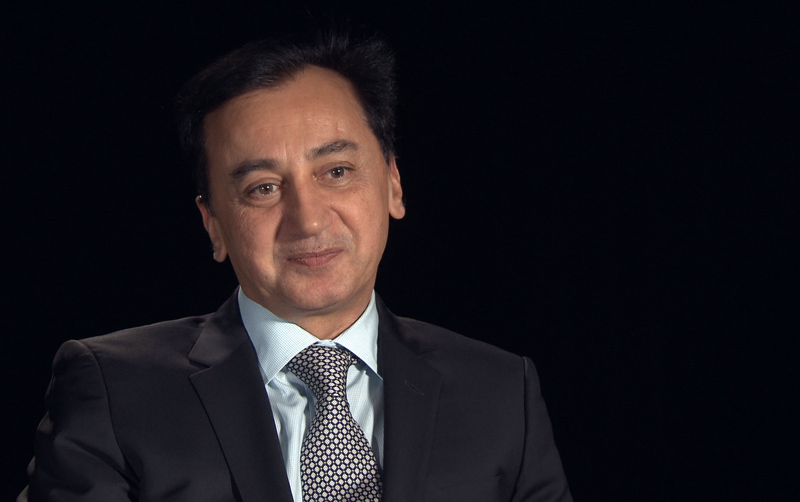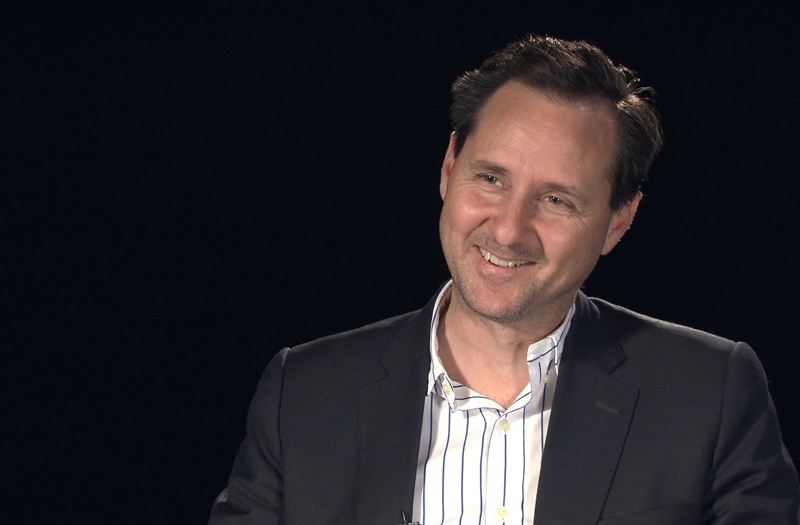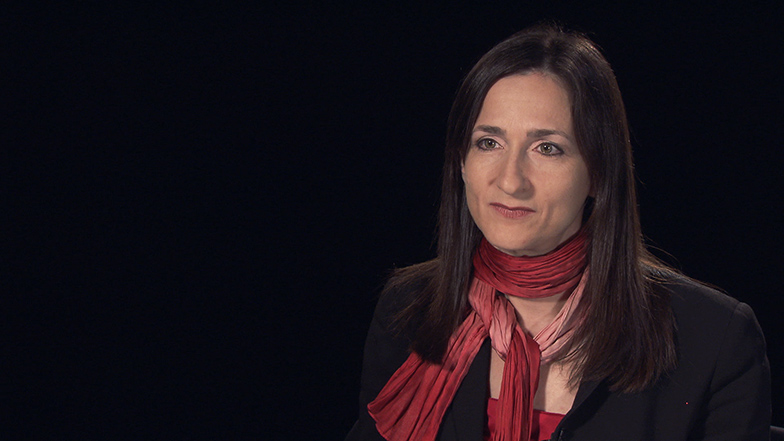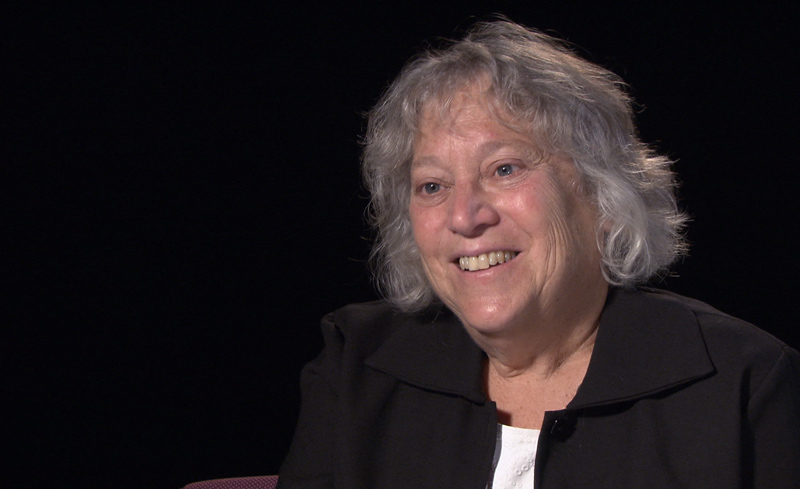David P. Maher
INTERVIEWER: Today is Tuesday, November 17, 2015. I'm Joe McMaster, and as part of the MIT Infinite History project, we're talking with Mayor David Maher. Mr. Maher is the current mayor of the city of Cambridge, and former member of the school committee. He has served on the Cambridge City Council since 1999, and previously served as mayor from 2010 to 2011.
He's a lifelong resident of Cambridge, and as mayor, he's been an advocate for maintaining vibrant neighborhoods in Cambridge. He's had a long commitment to public health, public schools, and environmental issues. Mayor Maher has a degree from Suffolk University School of Management. He was just reelected to the Cambridge City Council for an eighth term on November 3.
Thank you for speaking with us Mayor Maher, and congratulations.
MAHER: Thank you. Thank you.
INTERVIEWER: Eight terms is quite a record.
MAHER: It's a long time, but it's good work. I enjoy it greatly. Cambridge is a great community and a great city, and I think it's an honor to be able to represent the people of Cambridge.
INTERVIEWER: Now being reelected to the city council doesn't mean you're reelected to the position of mayor, as I understand it. So how does that work in Cambridge?
MAHER: Well, you're correct. The position of mayor is-- the nine city councilors in this form of government elect the mayor. So, obviously, the mayor-- excuse me, the mayor has to be one of the city councilors. That election just happened in November, and then in each-- every other January, the council convenes and will elect the mayor from amongst the membership. And I've had that honor twice, and this January, there'll be another election for mayor.
INTERVIEWER: Right, OK. So how does what the mayor does as a city council member differ from what a city council member does? Who, you know, somebody who's not mayor.
MAHER: A good way to think about it is that the mayor is really like the chairman of the board of directors. So the mayor chairs the city council, as well as the school committee. We have a nine person elected city council and a six member elected school committee. And the mayor is a voting member of both of those bodies.
And I think the mayor does a very significant amount of, some might say, ceremonial work. But there's a lot of requirements being mayor. In the form of government that we have, we have a city manager who is like the CEO. And then the mayor is really the chairman of the board. I think that's the easiest way to explain it to people.
And I will say, it's a professionally run city. So, you know, I think we're in a much better position than most other communities in the Commonwealth. And, surely, if you look around the country, we're actually in very, very good position. So the form of government, I think, is actually a very good one.
INTERVIEWER: You mean a good position-- how so?
MAHER: Well, financially. Stability. We were one of only a handful of countries-- excuse me, of cities in the country that have a AAA bond rating by all the big financial rating agencies. When you're looking at borrowing money for municipal uses, you want the best possible rate that you can get. And we're in that category.
I think that with-- this form of government has been in Cambridge for about 75 plus years, and it seems to be working well. It is a little bit confusing, sometimes, to the voters of the residents to understand. The fact that we have a CEO, and then we have the chairman, if that makes sense. I think all in all, I think the system works very well for the city.
INTERVIEWER: And what do you attribute, sort of, the success to? And where do the universities, and because obviously there are many universities in Cambridge, where they fit into the picture there?
MAHER: I think the town gown relationship between the city and the universities-- there's always going to be some tension. And I think that we've seen that in Cambridge, the tension, that-- the two biggest landowners in the city are in fact MIT and Harvard University. And they're both educational institutions. They're both nonprofit institutions. But if you really look at it, both of those entities are the driving force behind the economic engine that drives the city of Cambridge.
And so in no small part do we owe a lot of the success of our city, and the growth in the innovation economy to MIT and to our friends down the river at Harvard. But, you know, I think that obviously balancing that is a major role of the city government. And making sure that we allow a large institution, like MIT, to be able to grow and meet the changing needs that the Institute has in the 21st century.
But to be able to also realize the impact that growth has on our community, and our residents, and the ability of our residents to be able to get around town. But I think when you look at the economic impact of jobs that are created here, tax revenue that's created. In fact, MIT is in fact the largest property taxpayer in the city of Cambridge.
And I think that we want people to be able to kind of live, work, and play in the local community. And I think that the Institute, and the folks that work here and that go to school here, contribute in many, many ways to the city, and the vibrant vibrancy of the community.
INTERVIEWER: So you grew up in Cambridge, as we mentioned in the introduction. Maybe you can tell me about that? And where did you grow up, and what was that like growing up in Cambridge?
MAHER: Yeah, I did. I grew up here in Cambridge. I grew up in West Cambridge, kind of, now what's referred to Huron Village. And I actually continue to live in the same neighborhood that I grew up in. And, you know, I think that-- gee, the change has been significant.
I mean, if you look at Cambridge back-- I was born in '58. So growing up in Cambridge in the 1960s and the 1970s, I think that many people thought the better days of cities like Cambridge were behind us. People were moving out to the suburbs. People wanted the driveway and the backyard.
And I think that Cambridge today, I think, is in a better position than it was then. I think we're stronger. This is a community where real estate values have remained extremely high. People have invested in their property. I would say that the biggest change to me is the loss of the middle class in our community.
The working class-- you know, I grew up in a small street off of Huron Avenue. And my 90-year-old mother still lives in that house. But what I would say is that growing up-- my father was a police officer in Cambridge. And many of the folks that lived there were working families, that were either police or fire, or maybe worked for the post office or something.
And today John Malkovich is a neighbor of my mother's. So I think that it has changed dramatically. And I think that a lot of that is the University feel, the academic feel of the community has a much greater presence today than I think it did back in the '60s and '70s.
And I don't think that's a bad thing. I think that's a good thing. And I think the city is a place where-- we consistently hear this-- that more and more people are looking to come back to the city. And our population like many, many urban communities saw a decline after the 1970s. And the population in Cambridge has been on the way back up for many years now.
And, you know, I think on the downside of that is the fact that as housing constant increased, it makes it very, very difficult for folks who are on moderate-- or middle income folks-- to be able to buy property in Cambridge, or to rent property in Cambridge. There was a time when you-- I'm not going to say you couldn't give it away, but it was just not as desirable as it is today.
And I talk to folks all the time who have either sold their homes or are looking to come back here, and these are people that had lived in western suburbs of ours. And, you know, now look and say they would love to be back in Cambridge, where you can walk to the river, or walk to Harvard Square. Or Kendall Square, or Central Square, and have a great shopping experience and dining experience. I think we're seeing that change in the desirability. And I think there is a slight sense of a loss of community and folks knowing one another.
Again, having lived here and having both of my parents that grew up in Cambridge-- there was a time where I had aunts and uncles that lived in all the neighborhoods of the city. Very few relatives left here, but I think again, I think we've evolved. The city has evolved. And that change is not bad. Changes-- change can be good for community, and I think that we're consistently a changing community.
INTERVIEWER: Yeah, yeah. Well there's a lot there I'd like to pick up on, but just to cover a little bit of a sort of your earlier career. You said your father was a policeman, and did that influence-- I mean, surely it did influence you in some way. But did that influence your career choices?
MAHER: You know, it's funny because my father was a-- my father, after World War II, came back and, as I said, lived in Cambridge, but was called for the Boston police first. So he began his career in Boston and then moved back to Cambridge, and transferred to the Cambridge police department. And my dad, actually, in the 1960s, was a city councilor in Cambridge.
So I think the political career was somewhat sparked by that. I don't think I would have made a very good police officer. But, you know, I think I just grew up in a home where being a civil servant and being somebody that cared about this community deeply.
So I think that the influence is the love of the community and giving back to the community. I feel that if you have something to offer, and I think most of us do, it's a good thing to be able to invest and give back to your local community. Which I think you can have a significant impact, and I like to think that I've done that.
INTERVIEWER: So where did that start? You went to school in Cambridge, presumably, and then where did you go from high school?
MAHER: I went to the Cambridge public schools. And I went from kindergarten to eighth grade. And then the 1970s in Cambridge were kind of a very tumultuous time. And I'm the youngest of four siblings. And perhaps my father being in law enforcement at the time, they didn't want me to go to the public school at that time. The public schools were not thought to be the best at that period of time.
And I went to a small boys prep school in Cambridge, right next-door to the Longfellow House on Brattle Street. And I worked in Harvard Square. Worked my way through high school and college. And, you know, I think that local work-- I started to get involved.
I volunteered for a period of time on a task force that was looking at education in Cambridge. And I was running the Harvard Coop at that time. And I had worked my way through school at the Coop, and then stayed. Became the store manager of the Coop. And I think that that sparked an interest in public education. And, hence, I ran for school committee and started that political career.
But the whole time I have been involved in politics in Cambridge, I worked. And so I kind of transferred my work skills from the Coop, where I did work for a long time, into the local nonprofit field. And I spent about 20 years in a local nonprofit in Cambridge.
And I think that that work help shaped who I am as a politician and as a public servant. I think understanding many of the issues that families face. And, typically, families that don't have great wealth in the community and some of the obstacles that folks face. And I think it gives you a perspective and makes you a little bit more well-rounded in how you look at issues in the city.
INTERVIEWER: So what were your, sort of, goals on the school committee? And then, how did you decide to make a change from that to running for city council?
MAHER: Well, I think the goals on the school committee were that-- looking at public education, and especially if I went back in time. In the 1990s, when I was on the school committee, you know, I felt like the public schools were in a little bit of disarray. And I think that we were looking at how-- and unfortunately, I'm saying that we were looking, and today, we're still looking-- at how to really try to close the achievement gap. And the learning gap that we see with poorer kids and kids of color in the community.
And Cambridge is one of those very strange "Tale of Two Cities". We are a fairly affluent and educated city, but we have about 50% of the kids in our public school are on free and reduced lunch. They're kids who are largely living in public housing, and come from families where poverty is an issue. And it's an unfortunate statement of fact that those kids face challenges that other kids in our district don't face.
And so looking at how we can provide quality education and giving opportunity to all kids, regardless of the economic background, is a driving force behind me and what I have been about in public life. And I would love to be able to say we've solved that issue and we've moved on. The fact of the matter is that we haven't.
And we're still always looking to ways that we can address these issues. And I think it's really a pretty sad statement that poverty continues to be the great divide in this community and in this country. And so looking, always, at ways that we can be able to address this issue. And be able to give kids the tools that they need. I think that breaking that cycle of poverty is a hope and aspiration that we all have.
And we realize we can't solve the problem for everybody. But what you hope is that if a child is in the public schools today is going to do better than their parents did. And we see indications where that's happening, but it doesn't always happen. And so we're looking at ways that we can influence kids at an earlier age. And, really, from prenatal to the fact that they are-- prior to entering the public schools, and we're always looking for those ways we can help the family achieve.
INTERVIEWER: So tell me about some of the ways you've addressed this in your work, then.
MAHER: Well right now, we are looking at a new initiative, which is early childhood education. And what we can do as a community to be able to make sure that families are receiving services that they need, from prenatal right through grade three. To make sure the kids are able to read, and comprehend, and develop vocabulary that they're going to need to be able to be successful.
And I think if we wait and we start that at kindergarten, or we start it at first grade, we're oftentimes waiting too long. So the most recent initiatives are to get kids hooked on education and get the parents involved.
We face an obstacle in this community, that some other communities may not face, and it's the fact that we have language barriers. We are somewhat a "port of first call", if that makes sense. That we have immigrants from all over the world coming here. And we want them to assimilate into the local community, and be able to access. But sometimes, it's being able to reach out to those families.
So a few things that we're working on are a new project that is going to make it easier for people-- it's going to, basically, be an app that you are able to go on. It's called Find It Cambridge, and it's a way that we can hook people up with all kinds of things. Meaning that may be youth sports programs, it may be after-school programs, or preschool programs.
But instead of sending somebody out and sending them in 10 different directions, you'll be able to get access to the information. So Find It Cambridge is going to be coming up very shortly, and it's a, again, it's a way that's going to be a multilingual way for people to get access to information in a timely and easy way.
Another of those initiatives is Baby University, which is a program designed to take parents of young children-- oftentimes, parents that have either struggled or are newer immigrants to the community. And to be able to work with them on giving them all of the supports they're going to need to become better parents.
So teaching parents about the importance of reading to their children. About holding their children. Obviously, about literacy. And so you're working in a way that is taking people and kind of giving them all of the resources that they may need. This program has been going on, I think it's the sixth year, and we have a graduation ceremony each year for the program. And it's, again, it's quite extraordinary.
It's predominantly women, but not entirely. It's probably 75% women. And we move it around from one neighborhood to another. But it's typically centered in areas where poverty is an issue. And, again, it's a way to be able to hook people together, and not have people feel isolated. And oftentimes, there's an awful lot of isolation with newer immigrant families in with poverty itself. And so those are a couple of good examples, I think.
INTERVIEWER: Yeah, they sound like great examples. I read in terms of the elementary and middle schools, I guess awhile back, you were part of what, I think in the press, they called something like a radical re-imagining, or something like that. And so maybe you can tell me about that.
MAHER: This is the innovation agenda is what it was called. And it was a re-imagining of our structure. The system that Cambridge had and had operated under for many, many years was a K-8 structure. About a dozen elementary schools all sending their eighth graders off to high school, into one comprehensive high school.
The outcomes in those schools vary dramatically, and the size of that schools vary dramatically. So you would have one school in the western part of the city that might have 60 kids graduating from the eighth grade. And then you might have a school in the port area, or our area four, that might be graduating nine kids.
And I think that what we looked at is how could we create a critical mass of kids that would allow kids to be able to do after-school sports that they wanted. To be able to have a drama club. To be able to have a school band. To be able to have enough kids that they could have a better, more well-rounded education. And the superintendent-- and I was mayor at the time-- we, kind of, drove this initiative to--
Basically, what we did was we took and made all of our schools K to 5 schools. And then we had four regional upper schools. And we purposely did not call them middle schools because a lot of people quite honestly didn't have the best experience in middle school. And these schools are small. They are probably between 200 and 300 students. Actually, probably between 200 and 250 students.
And so we call them upper schools, has a little bit more of a private school connotation to it, but it was really around the size. And I'm not going to tell-- we're in the third year of this initiative. And the first year was a challenging year. The second year was trying to correct things. I think that overall, every student that I've spoken to, the students will tell you that the experience has been extraordinary.
The parents-- it's a little-- the challenges that have been out there, we're trying to work through the kinks. And I think we are working through the kinks. You know, I'm not going to tell you if you go from a school that had nine kids in the sixth, seventh, and eighth grade, so that's 27 kids. And now, suddenly, you have 250, there are discipline issues. And there are issues that we, perhaps, should have perceived that they were going to happen-- be more of a challenge.
But I think that all in all, these kids have had a much better opportunity and a much more well-rounded education. And we're working through the issues. This was done to help be an equalizer in the city. And what we did not want to do is to continue to have that "Tale of Two Cities".
And I'm very proud of the initiative. I think we did the right thing. It was a very bold action by the school committee and by the superintendent. And I feel that we're not quite where we want to be, but we're on the road to a much better system.
INTERVIEWER: Yeah, well it will be interesting to see how that progresses.
Other sort of issues that I know you've been very involved with-- I gather, a sort of public health and a number of initiatives around that with getting kids to bike more, I think. Is that right? Maybe you could tell me about some of these kinds of things.
MAHER: I think you're referring to a program that's called Cycle Kids. And Cycle Kids is a program that came in and-- many kids that live in poverty don't have the money, the families don't have the money to buy bicycles. And I think many of us to take that for granted that you grew up having a bike.
And what we found is if the family doesn't have a bike, the fact of the matter is that a lot of poor kids didn't know how to ride a bike. So Cycle Kids is a nonprofit local organization that would go in and they would do comprehensive bike programming with kids in fourth grade. So every kid in the fourth grade would go through safety, how to ride a bike. Not to be embarrassed if you didn't know how to ride a bike. You know, the importance of wearing-- bike safety and wearing a helmet, and reflective clothing, and the whole bit.
And so we were able to expand this program in the public schools. And with the expansion of the program, we were able to buy bikes. So if you didn't have a bike, there was a bike that you could use. And you could use that perhaps outside of school, or to get to and from school. So there was a whole initiative around this, and it is something that I was proud to do.
And the fact is that by catching kids at that age, you're getting kids to be able to experience something that they otherwise would not, perhaps, would not have been able to experience. And you're getting the exercise and physical activity that goes along with riding a bike. And so that's a good thing for our young people.
INTERVIEWER: Sounds like fun. One of the things, and you kind of alluded to this before, but was Cambridge becoming a place that's harder for middle-class families and lower-income families to live in? Just due to the cost of it. I mean, what have you done and what do you hope to do to address that? What can we do to address that?
MAHER: I wish I knew. I think this is-- it's one of the great challenges that we have in front of us. And I think as policymakers, what I am always trying to do is to find a way. We're not going to be able to fully correct this problem. But to be able to address it in a way that, I think, gives people hope and gives people an understanding that we understand the problem.
So I'll give you a couple of examples. I think, first of all, if you look at a long-time property owners. So folks that may have either inherited their homes from a previous generation or people that bought their homes many, many years ago. So I'll give you the example and say that if an 80-year-old widow bought her home 55 years ago, affordability, to her, may be the tax rate in the city.
And so we take that very seriously. And Cambridge has the lowest residential tax rate in the Commonwealth of any large municipality. There are a couple of small towns in the Cape that don't provide many services to their residents that might have a smaller dollar amount. But we are the lowest, and we're the lowest in greater Boston.
And so to them, the tax rate-- keeping the tax rate affordable. Providing those homeowners with the highest residential tax exemption that we can possibly do under Massachusetts law. That is providing affordability to keep those middle income families in the city of Cambridge. Looking at housing issues, if you're a police officer, a school teacher, a firefighter, how do you have those people being able to stay and live here.
And we have been using some creative solutions to that. And there are some examples. Right now, actually, in Kendall Square at the corner of Binney Street and Third Street, there are about 40 units of new housing that's going up there, and it's targeted towards middle-income families.
And those are families that quite honestly, in today's dollars, are making upwards of about $100,000. Somewhere between $80,000 and $100,000. Which may sound like it's a lot to some folks, but when you're looking to buy property in the city, it's not a lot. So I think what we're trying to do is to look at options around housing. And I will say that some of our university partners have been very good about stepping forward and helping us to address the housing crisis that we face in the city.
Cambridge has a wonderful program that's called inclusionary housing. Basically, any new housing that is built that has more than 10 units of housing, 15% of those units must be affordable in perpetuity. And they hand it over to the city to control. So if you build a building and it has 100 units of housing that can be built as of right. You give the city 15, which goes on top of the 100, and then we give you a bonus to allow for that. So the building winds up being a denser building, but the city winds up with 15 units of affordable.
And that is a huge plus we've created over 850 units of affordable housing, and by just doing that program alone. And so as we see development happen in Kendall Square, even in Alewife, our hope is as the people understand that the development is happening, in that we are advocating for housing. And the way to create that housing is by having new development.
There's obviously a balance and a push-pull with it. But those are some of the ways that we're trying to address housing costs in the city.
INTERVIEWER: Where do the universities, and places like MIT, fit in this? Because, obviously, they bring a lot of students to the city, which of course increases the housing pressure. But then there are obvious benefits to that too. So where do the universities fit?
MAHER: I think both of the universities, both of the large universities, have been good partners with us. One is, I mean, if I kind of broke the two of them out, because they're different. I think MIT-- MIT is looking at doing a significant building project on Main Street. And, really, to, I'm going to say, to enliven the campus and the entry to the Institute from Kendall Square.
I'm excited about this. I think it is a very forward-thinking project. And I will say that MIT came to the city and said this is what we would like to do. I think they listened to what the city would like in return. For a very long time, I think the large universities would look at it and say, this is our campus and you're the city. And I think there has been a morphing of that, so to speak. And I think people are looking at and saying, this is our city, and how do we create a more vibrant community for all of us?
So my hope is that what you're going to see with this new development being proposed by MIT, which is currently before our planning board, is a much more vibrant way of looking at the Institute. So there's going to be retail aspects of it that are going to serve residents as well as MIT students and employees.
There is a housing aspect to this, which will help us to address the housing crisis in the city. One, by creating more housing, but two, by adding to our portfolio of affordable units. And then it will also help better connect Kendall Square. I think Kendall Square has the potential to be the next big destination square in our city. For many years, people would look at Kendall Square and kind of think, well it's a park and ride. You'd leave the car, get on the T, and drive into Boston.
And I think now, I think people are looking at Kendall and saying there are places to eat. There's the movie theater. There is, hopefully, places that people can enjoy outdoor activities. They have great connections to the river, and that's how we are trying to reshape and rethink this relationship. So I think, in that aspect, I think that the relationship has really become a much more mature relationship.
I would say that down river with Harvard, Harvard owned a lot of housing in the community. And was a little bit in-- back several years ago-- they were in the business of buying some property and holding the property. Harvard has actually turned around and sold a fairly significant amount of housing units back to the city's nonprofit partners.
And just a few months ago, I went to an opening of 2 Mount Auburn Street, which is a senior and disabled building. 94 units of housing, at the corner of Mount Auburn Street and Putnam Avenue. Which has been protected because Harvard sold it to a nonprofit partner. And so all the folks that live in that building are protected in perpetuity. And that's a huge win for us. And I think it shows, improves the relationship in the commitment that a large university can have to their host community.
INTERVIEWER: So you mentioned the Kendall Square development, which is, well, maybe beginning.
MAHER: Percolating.
INTERVIEWER: That's right. What-- I mean, we mentioned a few your hopes, but how do you see that playing out? What do you think that would look like 10 years from now? And what effect would that have on the city?
MAHER: I have great hopes for what that-- is going to happen there. I think that Kendall Square, in its initial rehabilitation, so to speak, that happened in the 1980s, had a very suburban office park feel to it. And I think many of us, who have been on the council for a number of years, made a commitment that we were going to try to correct that issue.
So what you didn't want is a building being built with a parking lot outside. And you'd go two blocks without there being another building. So I think we're well aware of what it takes to create a vibrant community. And it takes shopping, it takes nightlife, it takes activating the streets.
And so I think that when I look forward and think, what is Kendall Square going to look like, I see Kendall Square as being a bustling place, where people can find daycare. Where they can go shopping, where they can find a drug store, where they can see a supermarket. And I think that's going to happen within the next 10 years.
And 10 years ago, you didn't really talk about Kendall Square and housing in the same sentence. And now we're talking about Kendall Square and housing in the same sentence. And between MIT's commitment with their building project, and then looking at the prospect of rebuilding the Volpe Center site.
Just today, I met with many representatives from the GSA, who came up from Washington, and are looking at how that is going to happen. And there is the potential there to develop 14 acres of land in the middle of Kendall Square. And I think it will, again, help shape what the future of Cambridge is going to be. And I can go back and say that I remember Kendall Square when it was-- the only thing that was really in Kendall Square, besides the parking lots, was the old F&T diner.
And today, you look and say, there's so much that we have here. And there's a lot more that can be done to make it an even more exciting place. You know, and I will say that when you look at the neighborhoods that surround Kendall Square-- so you look at either east Cambridge, Harrington, Wellington, or Area 4, the Port.
One of the big benefits of dealing with the Institute, and working with the Institute, is to try to find better ways that we can connect those neighborhoods to the rich resources that we have with the river. And in the walkways and how people get around, and I think that we've been trying very hard to do that and kind of reimagine what Kendall Square can look like. And, you know, the development of the canal and looking at the shopping area, or in the restaurants along the canal, and the vibrancy of that, that's another big boon to the city.
INTERVIEWER: Yeah, you mentioned the Volpe Center, which, of course, started as a NASA facility way back. I don't know if you were here.
MAHER: I was a child.
INTERVIEWER: You were a child, I don't know if you remember it so much, but it is extraordinary. Because it seems like, and even as they described it to me, they, sort of, were one of the early developments in this area.
MAHER: What I would say is the folks from Volpe have been terrific community partners. And there is no doubt that the Volpe Center has outgrown its space, and outlived its usefulness in that building. The building has outgrown its usefulness.
If we want to continue to see the Volpe Center here in Cambridge, which I think is important to us, as a community, the Volpe Center has to grow and change. And this gives-- you know, I can go back and say that every administration, whether a Democratic administration or a Republican administration in Washington, the city, or the Cambridge redevelopment authority, or the Volpe Center has been trying to deal with every administration to make this happen.
Tip O'Neill came from Cambridge, one of the most powerful men in the United States government for a long period of time, Speaker of the House. Nobody could get it done. And we have the opportunity right now, and it's a very unique opportunity. To get the Volpe Center, and to get us to be able to deliver that land is-- it's a tremendous opportunity. And it's an opportunity, which I think is a legacy opportunity, to be able to shape the future of Kendall Square.
And I think it's the right thing to do. I think any time that a project like this comes forward, or proposal like this comes forward, you're going to find, well, why do we have to do it now? And I'm afraid that if we look at this too long, we will lose the opportunity that we have before us.
The Volpe issue, I believe, we have to resolve it while President Obama is president. The administration has made a commitment that they're willing to do this. And we do not know what's going to happen after November of next year. And so, I think we have to act fairly swiftly, and I think we have to be prudent. And we have to make sure that we are doing the right thing as we look 40, 50 years out what that site is going to look like.
INTERVIEWER: And what would it potentially look like? Is it going to be a public, private thing? Or how does this work?
MAHER: Basically, this is a provision that GSA has available to them, which has not been used very often at all. In fact, I think this might be only the second time that it's being used. In that it's almost like a land swap. That the Volpe center needs to be made whole, so a private developer needs to build a new Volpe building. In return, they will get the balance of the land.
The site is 14 acres and the needs of the Volpe Center are approximately four acres, so there will be approximately 10 acres left. And the developer will have to-- that's what they'll get is the space. But they have to build and make the Volpe Center whole. And I think-- kind of "back of the napkin" calculations are, that's going to cost a developer somewhere between $300 and $400 million to build a new Volpe site.
So that's what they're basically paying. If you figure out, its 30 to 40 million per acre that the developer's winds up paying for the balance of the land. And there has to be streets and public parks. And our hope is that what we're going to see is a mixed-use development that will be made up of retail space, open space, housing, including about 200 units of affordable housing-- which will remain affordable in perpetuity-- and additional commercial space.
So that's kind of the vision, and we're working through-- it's a very complex issue, and we're working through the zoning right now. But my hope is that we're going to be able to come together on this.
INTERVIEWER: That will interesting. It's a quick timetable from now.
MAHER: It is.
INTERVIEWER: Looking just up the street is, between Harvard Square and Kendall Square, is, of course, Central Square, which has got its own challenges and stuff. What's your vision for Central Square? Where is it in its development?
MAHER: Well, I think that there are-- I would almost break it into two sections. And say that Central Square-- in the midst of Central Square-- first of all, I'm excited that we're going to see a city Target coming to Central Square very soon.
And Target announced a plan to bring in a new 20,000 square foot space at the corner of Pearl and Mass Avenue. I think that's going to be a great addition to Central Square, because, right now, if you can go to Central Square and you can eat in Central Square, and you can get take-out in Central Square. And you could probably go to a liquor store in Central Square, but there's not a lot of shopping opportunities in Central Square. So I think I think that the Target is going to be a nice addition.
I will say that the city has been very committed to looking at Central Square in ways that we can improve Central Square. We face a lot of challenges. If there's an urban downtown area of the city, it's Central Square. And like many urban downtown areas, we face issues. I think that the issue of homelessness and addiction has, kind of, plagued us there.
And, you know, I would say that I think our police department and our social service partners have been very active in the Square, trying very hard to kind of be respectful of folks, but trying to, kind of, clean things up. It's been a challenge and I think it's fair to say that.
We've looked at different ways that we can put more eyes and feet on the street, so to speak. So you see a lot more cafe style seating in Central Square over the years. And I think that the business association has been very good at highlighting the cultural aspects of Central Square. There are a lot of street fairs. There's a lot of opportunities for people to gather.
I don't know when you look at the transportation hub that Central Square is-- so there's many, many bus lines coming into the Square. That poses an issue and a challenge for us. Looking at how safety on the street for pedestrians and bicyclists, we're constantly looking at that. We just redesigned Western Avenue to kind of make that a thoroughfare for bike and pedestrian safety, going down to the river from Central Square.
So I think we're looking at a lot of things. We just had a fairly controversial project at the corner of Mass and Main Street, called Mass and Main. And it's a project that was approved by the city council that will put a 19-story building there. So it's kind of a gateway project, if that makes sense.
And it's a market-rate housing. It's going to have a lot of retail on the first floor. And I hope it causes folks to reimagine the possibilities of Central Square. Because I will say that many of the challenges that we face in Central Square today, are the same challenges that we had 16 years ago when I joined the council.
And with we haven't yet seen the progress that we had hoped to see. So I think that looking at this Mass and Main project, I think that we have an opportunity to kind of re-envision and make it a gateway project. I will say the second aspect of Central Square is really between Sydney Street and in the Institute.
And I think that we've seen significant changes there. And I think the changes have been much better. I think that a goal is to be able to better connect the MIT campus and South Mass Avenue to Central Square. And I think that through new retail aspects and a retail corridor there, looking at the new Novartis building that's coming online.
And the new Forest City Millennium building, all of these the city has been very judicious in looking at how we can add retail space. How we can enliven the streetscape of Mass Avenue, so you would feel safe and better connected to the MIT campus and down to the river.
INTERVIEWER: Some very amazing buildings going up there.
MAHER: There are. And I think, again, there were places where I'd describe it as saying, that where the new Forest City Millennium building is going, that was like a missing tooth along Mass Avenue. It was a dead block there. And I think that there are some exciting retail prospects that are coming in there that I think are going to help better connect.
Again, we want people to be able to go from MIT's campus, or from the river, or from across the river, and connect into Central Square. And allow those businesses that are in Central Square to thrive. And there are a lot of smaller independent-owned businesses along the avenue there, and I think this is a way to better connect them.
INTERVIEWER: You know, it's interesting because it kind of keeps coming up over and over again, the dual nature, I guess, as you put it, of Cambridge. Or I think you-- I don't know if you used those exact words, but there's a city of haves and have-nots. You also have this incredibly successful businesses. When you look around Kendall these days, there's evidence of that everywhere.
And then these amazing universities and all that that brings with it. I mean, I think there have been ways you've tried to sort of connect those two into the schools and things, is that right? Or is there more that can be done in that realm or...?
MAHER: It's funny because we just completed a search for new superintendent of the public schools. Longtime superintendent of the Cambridge Public schools, Jeff Young-- who's done a great job leading our public schools-- is retiring at the end of June. And we did a search for a new superintendent. We are pleased that we're going to be joined by Kenny Salim, who is currently the superintendent of the Weymouth public schools, is going to be coming to Cambridge.
And I would say I think that one of the big tasks that lies ahead for the new superintendent is to look at the changing economy in the city. If you went back a few years ago you would have seen a lot of manufacturing companies in the city. And they were places that people could work, make a decent income, and support a modest household.
Those jobs have been lost in the city. But currently, we have 110,000 people that work in Cambridge. And looking at that innovation economy, and how we can better connect our residents to the innovation economy is something that we need to do a better job with. And I think that what better place to do that than through our educational system and our partners?
So I fully expect that the new superintendent of schools, a major role is going to be connecting our young people to businesses and institutions within the city. We have two of the finest world class educational facilities in the country right here in Cambridge. We have some of the top research facilities, again, in the world, happening right here.
So, you know, old candy companies have been transformed into some of the best research and development companies in the world. And how do we make our young people give them the opportunity to experience STEAM and STEM educational opportunities? To be able to have them in real laboratories working with scientists.
I think that the potential is boundless. I think it's a great opportunity for our young people, and I think that's where a major focus is going to be going forward. And, you know, what we don't want to do is to-- I always say this to young people in the city, think big and think bold. And don't limit yourself. And I think that when we look at the innovation economy, the innovation economy is thinking bold and thinking big.
And I just want to be able to expose our young people and our residents, and I think, sometimes, there's a disconnect. I think sometimes people look at these big buildings that go up in Kendall Square, and I don't think they really fully understand what's happening in the buildings.
And I think what both our university partners with Harvard and MIT, I think that both of the big institutions have been much more willing to open their doors to let our young people experience what's happening here, also. And that's a win-win, because what we want to do is we want something, somewhere along the line, to spark an interest in our young people. And that person may change the world going forward, and that's I hope the we all have.
INTERVIEWER: When you were growing up, you grew up more on the Harvard end of town, but did ever come down to MIT? Do you have recollections of it? What was your perception of it at the time?
MAHER: It's funny, I guess I would say I don't think that the universities were as welcoming to residents back then. I mean, I just-- having worked in Harvard Square and all, I probably had a lot more exposure to Harvard than I did to MIT. I guess that that has made me a little bit aware in trying to break down those barriers.
I will say, when I first got elected to the city council, I was shocked to find out that there was no university relations committee. There was no vehicle to have the city council and the universities at the same table. Depending upon who the mayor was, depending upon who the city manager would be, there were dialogues now and then, but there was no vehicle. And so I brought forward the policy order that created the University Relations Committee of the city council, that we would have dialogue, so we would find out.
And one of the interesting things that we found out right away at that time was that the universities have concerns about what's going on in the city. One of the issues that came up was around the recruitment of faculty. And that if a faculty member were to look at Cambridge and they were to look at our public schools, or they were to look at Stanford, or somewhere else, and look at the local public schools, they may be making the decision on where to take the job based on the public schools.
And so there was a lot more appreciation and understanding of what is going on, and an ability to help out. I think any good community-- we're limited in what we can do. And I think that, at times, we need our university partners to step forward and to be able to assist and help us to be able to accomplish things. And we shouldn't be afraid to ask. And I think we need to have that dialogue. And so we've been able-- I would say, I think we've done a lot more of that in the past 15 or 20 years than we have previously.
INTERVIEWER: So you've seen a real change in the sort of town gown, as it were, relations?
MAHER: Absolutely. I think both-- the town gown relationships between the two big institutions in the city are, I believe, at the best place that they've been. And I think there is a mutual understanding about what the goals are. Some of it is somewhat forced, if that makes sense, because we, you know.
I mean, Cambridge is a very densely populated city. There's not a lot of open land. It's pretty built out. So I can think the large institutions have to be able to say to the city, this is what we want to do. But I think the city, in turn, needs to be able to say, this is what we want to do. And I think when you have the dialogue and the back and forth, you're going to wind up with a better solution than having a one way conversation, which I think it was for a very long time.
INTERVIEWER: Right. Just changing the subject, I mean, one thing that has been very much in the news and was a big change in Cambridge, Cambridge was right on the forefront of gay marriage. And I'm just sort of wondering where-- how you're going to reflect on the significance of that? And Cambridge being really first and leading that. And how that's affected the city.
MAHER: To look back and to think that you witnessed history, and you witnessed a change that, I think, the people-- in a way, it's kind of like the civil rights movement, and that people that we all know that saw this. And I think, today, for a young person today to think back and say, that really happened.
And I can remember the night of the Supreme Judicial Court had issued their ruling. And some of my colleagues on the city council said, well, why don't we open at midnight and start to issue the marriage licenses? Or the marriage intentions.
I went there that night. At midnight, well a little before midnight, and I think most everybody that was in any kind of leadership position in the city went. There were all kinds of threats about the Westboro Baptist Church was going to be protesting. We were going to have to have police SWAT teams there protecting people and all.
But what I would say is I didn't know what to expect. And I went that night and I parked, because the streets around City Hall were all closed. And I was walking up and I could hear all this noise. And I thought, well what am I walking into? And I got there and there were literally thousands of people outside of City Hall in a jubilant and celebratory way.
And it was then that it struck me that I was witnessing history in the making. And I think that Cambridge played a role in that. I think this has always been a welcoming diverse community. And one where we celebrate the differences of the community. And I think that since that time, I've had the opportunity to host a 10-year anniversary of the marriage equality.
Just last week I was standing out in front of a polling place, greeting voters, and Margaret Marshall, who was the Chief Justice that wrote that decision, went in to vote. She lives in my neighborhood. My hope is that people remember this. And that they understand that this, like previous, big changing, life-altering movements in this country, that we've experienced. This was a very, very powerful time in the city of Cambridge. And one that I'm proud of.
I will say that the former city clerk of the city of Cambridge, who we now call a clerk emeritus, Margaret Drury, was the person who made that first marriage. In just a respectful and dignified-- and I think that's what I would take away is that the respectful and dignified way that every employee in the city of Cambridge treated every single person that came through that hall that night was tremendous.
INTERVIEWER: That's great. Just a few more things I wanted to touch on. This being the 100th anniversary of MIT's move across the river to Cambridge--
MAHER: I did not recruit them.
INTERVIEWER: Well, I guess it was one of your predecessors.
MAHER: It was. It was.
INTERVIEWER: What to you is, sort of, the significance of that? Personally, or as the mayor, or significance, what do you think the significance to the city is? And this is something I've been asking everybody.
MAHER: I think it was a very insightful decision that MIT made. And I think, both for the institute and for the city of Cambridge, this has been a very positive relationship. And I think that looking back, I think that MIT has matured. I think it has been a good community partner. And I think that there are many, many more ways that we can continue to work together.
I think this has been a terrific, terrific relationship over the past 100 years. I might have experienced around 20 or 25 of those years, but I think that the Institute has been there for Cambridge. I think that, obviously, the impact on our economy. I think on jobs in this community. On education, I think those are all very, very positive things for this community.
I think we have a lot more things that we can collectively address. I look forward to how we can figure out to work together on issues, affecting our young people in sparking the interest in science and technology. And making kids dream and making kids think about all the opportunities that are available to them. And I think we can do that together.
INTERVIEWER: Great. Well is there anything else you'd like to add at this point? I'll look to and see if there's anything else I wanted to touch on, but--
MAHER: You look. I jump around a lot, I know that.
INTERVIEWER: No, no. It was great. We've covered an awful lot of ground and that's terrific. That's the goal.
MAHER: One thing that I would talk about is I would talk-- I think, when we also talk about relationships, I think that we have to value the relationship that our police department, and the MIT police department, and the Harvard University police department. We are very, very lucky in this community to not only have our municipal police force, but to have two large police forces in partners with Harvard and MIT.
And I think that the tragedy that happened here at MIT was quite an extraordinary situation. And one that I think helped redefine that relationship. I'm a firm believer that our police department, the Cambridge police department, and the MIT police department have never been closer. And have never worked more closely and respectfully as they have over the past several years.
And I had the opportunity to talk with a number of the MIT police officers, and our own police officers, and I think there was a brotherhood there that is quite extraordinary.
INTERVIEWER: It's wonderful that something positive can come out of that.
Great, wonderful. Well, thank you so much for taking the time to talk with us.
MAHER: Thank you. Thank you.
